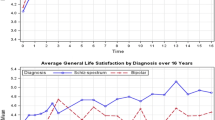Abstract
Thorough follow-up and tracking procedures are critical when working with hard-to-reach populations such as drug users. Attrition in research can affect internal and external validity; therefore it is particularly important to use unique and creative tracking strategies in conducting longitudinal studies. Computerized follow-up procedures that were used to re-locate injection drug users (IDUs) and crack cocaine users after a 4–13 year period are described. Data are from a follow-up study conducted from 1999 to 2003, which re-located subjects who were initially recruited for NIDA’s Cooperative Agreement, which took place from 1990 to 1995 in Denver, Colorado. Trackers used traditional approaches as well as computerized means to locate subjects despite scant locator information. Important lessons can be learned about the use of electronic means for locating hidden populations for health sciences research.
Similar content being viewed by others
References
Bale, R.N., Arnoldussen, B.H., Quittner, A.M.: Follow-up difficulty with substance abusers: predictors of time to locate and relationship to outcome. Int. J. of Addict. 19(8), 885–902 (1984)
Biglan, A., Hood, D., Brozovsky, P., Ochs, L., Ary, D., Black, C.: Subject attrition in prevention research. In: Leukefeld, C.B., Bukoski, W.J.E. (eds.) Drug Abuse Prevention Intervention Research: Methodological Issues, NIDA Research Monograph No. 107, National Institute on Drug Abuse. Rockville, MD (1991)
Bootsmiller, B.J., Ribisl, K.M., Mowbray, C.T., Davidson, W.S., Walton, M.A., Herman, S.E.: Methods of ensuring high follow-up rates: lessons from a longitudinal study of dual diagnosed participants. Subst. Use Misuse. 33, 2665–2685 (1998)
Claus, R.E., Kindleberger, L.R., Dugan, M.C.: Predictors of attrition in a longitudinal study of substance abusers. J. Psychoactive Drugs. 34(1), 69–74 (2002)
Cottler, L.B., Compton, W.M., Ben-Abdallah, A., Horne, M., Claverie, D.: Achieving a 96.6 percent follow-up rate in a longitudinal study of drug abusers. Drug Alcohol Depend. 41, 209–217 (1996)
Desmond, D.P., Maddux, J.F., Johnson, T.H., Confer, B.A.: Obtaining follow-up interviews for treatment evaluation. J. Subst. Abuse. Treat. 12(2), 95–102 (1995)
Goldstein, P.J., Abbot, W., Paige, W., Sobel, I., Soto, F.: Tracking procedures in follow-up studies of drug abusers. Am. J. Drug Alcohol. Abuse. 4(1), 21–30 (1977)
Gwadz, M., Rotheram-Borus, M.J.: Tracking high-risk adolescents longitudinally. AIDS Educ. Prev. (Fall Suppl.), 69–82 (1992)
Hall, E.A., Zuniga, R., Cartier, J., Anglin, M.D., Danila, B., Ryan, R., Mantius, K.: Staying in touch: a fieldwork manual of tracking procedures for locating substance abusers in follow-up studies, 2nd edn. Los Angeles, CA, UCLA Integrated Substance Abuse Programs (2003)
Hansen, W.B., Collins, L.M., Malotte, C.K., Johnson, C.A., Fielding, J.E.: Attrition in prevention research. J. Behav. Med. 8, 261–275 (1985)
Hansten, M.L., Downey, L., Rosengren, D.B., Donovan, D.M.: Relationship between follow-up rates and treatment outcomes in substance abuse research: more is better but when is ‘enough’ enough? Addiction 95(9), 1403–1416, (2000)
Nurco, D.N. (ed.): Follow-up fieldwork: AIDS outreach and IV drug abuse. Department of Psychiatry, University of Maryland School of Medicine, 1990
Ribisl, K.M., Walton, M.A., Mowbray, C.T., Luke, D.A., Davidson, W.S., Bootsmiller, B.J.: Minimizing participant attrition in panel studies through the use of effective retention and tracking strategies: review and recommendations. Eval. Program Plan. 19(1), 1–25, (1996)
Scott, C.K.: A replicable model for achieving over 90% follow-up rates in longitudinal studies of substance abusers. Drug Alc. Dep. 74, 21–36 (2004)
Twitchell, G.R., Hertzog, C.A., Kein, J.L., Schuckit, M.A.: The anatomy of a follow-up. Brit. J. Addict. 87, 1327–1333 (1992)
Walton, M.A., Ramanathan, C., Reischl, T.M.: Tracking substance abusers in longitudinal research: understanding follow-up contact difficultly. Am. J. Commun. Psychol. 26, 233–253 (1998)
Woody, G.E., Metzger, D., Mulvaney, F.: Recruitment and retention of in- and out-of-treatment injection drug users. AIDS Res. Hum. Retroviruses 10, S197–S199 (1994)
Wright, J.D., Allen, T.L., Devine, J.A.: Tracking non-traditional populations in longitudinal studies. Eval. Program. Plan. 18, 267–277 (1995)
Ziek, K., Beardsley, M., Deren, S., Tortu, S.: Predictors of follow-up in a sample of urban crack users. Eval. Program. Plan. 19(3), 219–224 (1996)
Acknowledgements
This research was supported by the National Institute on Drug Abuse, R01 DA 12322 and DA 06912. The authors would like to thank the research subjects who participated in this study, without whom this would not have been possible. The authors would also like to acknowledge the hard work and dedication of the staff at Project Safe.
Author information
Authors and Affiliations
Corresponding author
Rights and permissions
About this article
Cite this article
Corsi, K.F., Van Hunnik, B., Kwiatkowski, C.F. et al. Computerized tracking and follow-up techniques in longitudinal research with drug users. Health Serv Outcomes Res Method 6, 101–110 (2006). https://doi.org/10.1007/s10742-006-0003-2
Received:
Revised:
Accepted:
Published:
Issue Date:
DOI: https://doi.org/10.1007/s10742-006-0003-2




